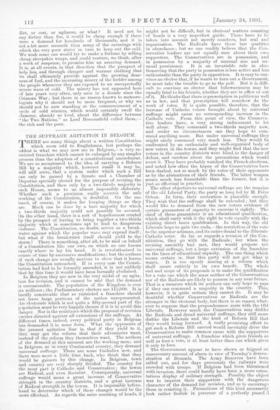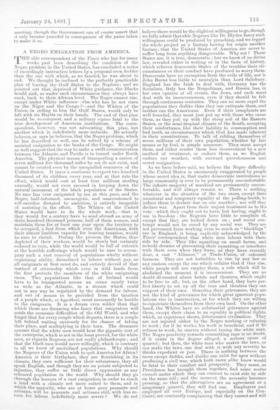THE SUFFRAGE AGITATION IN BELGIUM. T HERE are many things about
a written Constitution which seem odd to Englishmen, but perhaps the oddest is what we may now see in Belgium,—a very re- stricted franchise which cannot be enlarged by any simpler process than the adoption of a constitutional amendment. We are so accustomed to the idea of carrying a Reform- Bill by a majority which, however small it may be, will still serve, that a system under which such a Bill can only be passed by a Senate and a Chamber of Deputies specially elected for the purpose of revising the Constitution, and then only by a two-thirds majority in each House, seems to us almost impossibly elaborate. Whether such a provision really secures the safe working of the Constitution, is doubtful. On the one hand, of course, it makes for keeping things as they are. Much can be done by a bare majority for which a two-thirds majority could not possibly be secured. On the other hand, there is a sort of hopelessness created by the prospect of having to bring together a two-thirds majority which is sometimes apt to lead to dangerous violence. The Constitution, no doubt, serves as a break- water against which the popular wave may expend itself ; but what if the breakwater itself should yield to the storm ? There is something, after all, to be said on behalf of a Constitution like our own, on which no one knows exactly where to lay his hand. It is revolutionised in course of time by successive modifications ; but the authors of each change are usually anxious to show that it leaves the Constitution untouched. If in every case the Consti- tution had had to be formally amended, it is not unlikely that by this time it would have been formally abolished. In Belgium they are now in the very midst of an agita- tion for revision, and it cannot be sad that the demand is unreasonable. The population of the Kingdom is over six millions ; the Parliamentary electors are 115,000. It is hardly conceivable that so restricted a franchise should not leave large portions of the nation unrepresented. An electorate which is not quite a fifty-second part of the population must be very happily chosen if it is to avoid this danger. Nor is the resistance which the proposal of revision excites directed against all extensions of the suffrage. At different times, indeed, every political party in Belgium has demanded it in some form. What the opponents of the present agitation fear is, that if they yield to it, they may get the reform that their adversaries want, instead of the reform they themselves want. The authors of the demand at this moment are the working men; and in Belgium, as in every Continental country, they demand universal suffrage. There are some Catholics now, and there were more a little time back, who think that they would be gainers by this change. In Belgium, town and country are very sharply divided. The country for the most part is Catholic and Conservative ; the towns are Radical, and even Socialist. Consequently, universal suffrage would mean a great increase of Conservative strength in the country districts, and a great increase of Radical strength in the towns. It is impossible before- hand to determine which of these changes would be the more effectual. As regards the mere counting of heads, it might not be difficult, but in electoral matters counting of heads is a very imperfect guide. There have to be taken into account not merely numbers, but zeal and organisation. The Radicals have these last qualities in abundance ; but we can readily believe that the Con- servative leaders are not equally sure about their own supporters. The Conservatives are in possession, and in possession by a majority of unusual size and un- usual persistence. It is an invariable rule in elec- tioneering that the party in possession is less active and less enthusiastic than the party in opposition. It is easy to con- vince an elector that, if he wants to turn out a Government, he must take the trouble to go to the poll. But it is diffi- cult to convince an elector that lukewarmness may be equally fatal to his friends, whether they are in office or out of it. He thinks that there is prescription in politics as well as in law, and that prescription will somehow do the work of votes. It is quite possible, therefore, that the increase of Catholic voters brought about by universal suffrage might cause no corresponding increase in the Catholic vote. From this point of view, the Conserva- tive leaders have, a very strong inducement to let well alone. They command a two-thirds majority now, and under no circumstances can they hope to com- mand anything more. But under universal suffrage they might easily command very much less. They would be confronted by an enthusiatic and well-organised body of new voters in the towns, and they might find that the new voters in the country districts were blind to the danger of defeat, and careless about the precautions which would avert it. They have probably watched the French elections, and noted how often the hopes of the Conservatives have been dashed, not so much by the votes of their opponents as by the abstentions of their friends. The latter weapon seems much less formidable than the former, but it is just as effectual in practice.
The other objectors to universal suffrage are the remains of the old Liberal Party, the party so long led by M. Fri-e Orban. In form, their contention is plausible enough. They wish that the suffrage shall be extended ; but they would like to demand from the new voters evidence of certain guarantees of capacity to exercise it rightly. The chief of these guarantees is an educational qualification, which shall carry with it the right to vote equally with the existing direct taxes qualification. In this way, the old Liberals hope to gain two ends,—the restriction of the vote to the superior artisans, and its entire denial to the illiterate Catholic voter. So far as regards a revision of the Con- stitution, they go with the Radicals ; but when the revising assembly had met, they would propose not universal suffrage, but a large extension of the franchise on the lines of educational capacity. The one thing which seems certain is, that this party will not get what it wants. It is too openly aiming at a reform which shall enure entirely to its own benefit. The whole end and scope of its proposals is to make the qualification for a vote one which the mass neither of the Conservatives nor of the Radicals are likely to possess in any near future. That is a measure which its authors can only hope to pass if they can command a majority in the country. This, however, it is quite certain they cannot do. It may be doubtful whether Conservatives or Radicals are the stronger in the electoral body, but there is no reason what- ever to suppose that the preponderance rests with the Old Liberals. However much the Conservatives may dislike the Radicals and dread universal suffrage, they still more dislike the Liberals and the kind of Reform Bill that they would bring forward. . A really promising effort to get such a Reform Bill carried would inevitably drive the Conservatives to make common cause with the supporters of universal suffrage. A franchise which gives friends as well as foes a vote, is at least better than one which gives it only to foes.
The Government appear to have shown or feigned an unnecessary amount of alarm in view of Tuesday's demon- stration at Brussels. The Army Reserves have been called out, and for days previously the railways were crowded with troops. If Belgium had been threatened with invasion, there could hardly have beena more osten- tatious display of military strength. Possibly the object was to impress their supporters with the dangerous character of the demand for revision, and so to encourage them in resisting it. Precautions of this kind necessarily look rather foolish in presence of a perfectly peacef 11 meeting, though the Government can of course assert that it only became peaceful in consequence of the pains taken to make it so.







































 Previous page
Previous page